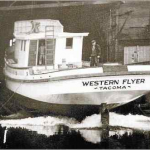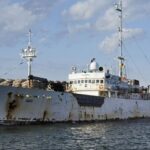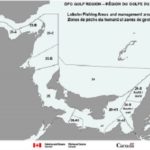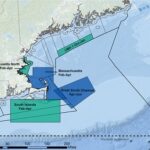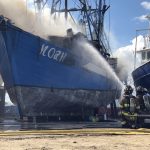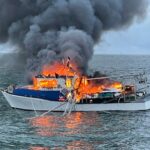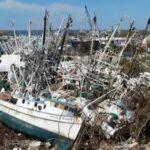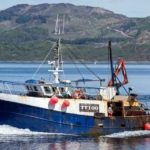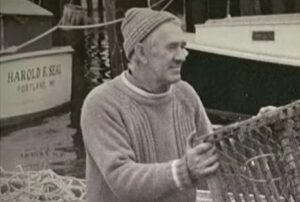Daily Archives: April 22, 2017
A Response – Speak plain English: Scientists can do a better job talking to fishermen
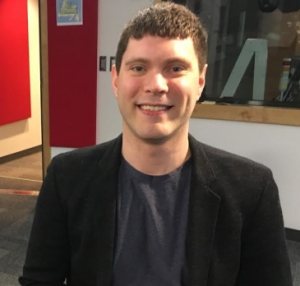 I have just read your recent article by Brett Favaro, director of the Fisheries Sciences at Memorial University’s Fisheries and Marine Institute. “Speak plain English, Scientists can do a better job talking to fishermen, CBC News”. It mirrors what the scientists at the Northeast Science Center at Woodshole have concluded. They are hiring someone to do exactly that, translate between the scientists and the fishermen. I can’t believe that so many brilliant scientists could be so very “intellectually challenged” and arrogant.
I have just read your recent article by Brett Favaro, director of the Fisheries Sciences at Memorial University’s Fisheries and Marine Institute. “Speak plain English, Scientists can do a better job talking to fishermen, CBC News”. It mirrors what the scientists at the Northeast Science Center at Woodshole have concluded. They are hiring someone to do exactly that, translate between the scientists and the fishermen. I can’t believe that so many brilliant scientists could be so very “intellectually challenged” and arrogant.
I have spent my entire adult life fluctuating between fishing and science. My husband is a full time commercial fisherman and my youngest son is a PhD bio mathematician. They understand each other perfectly well. My son fished with his father from the age of 12. He understands fishing and how to listen and how to explain science.
In my opinion the problem is not that the fishermen do not understand the scientists. It is that the scientists no longer understand fishing. The program that you need to add to the curriculum is a year on the back deck learning the ins and outs of actual fishing. How to garner the best data possible from a working fishing vessel. What we have lost is the ability of the scientist to really listen to the fishermen and value their observations.
We should take a lesson from the renown scientist, Henry Bigelow, who spent most of his working career on the back deck of fishing vessels and paying fishermen for their knowledge. Listening to their observations and carefully cataloging them.
Ellen Goethel
Biologist/Owner Explore the Ocean World,LLC
Hampton, NH USA 19:35
New York Aquarium claims fishing groups distorted stance on Hudson Canyon National Marine Sanctuary
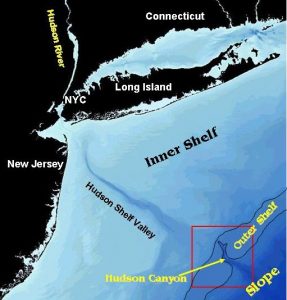 I am writing to correct the mischaracterization of the position and intentions of the Wildlife Conservation Society and its New York Aquarium regarding a proposed Hudson Canyon National Marine Sanctuary as reported in the Press. Contrary to the comments by Garden State Seafood Association Executive Director Greg DiDomenico (April 7 click here) and Recreational Fishing Alliance Executive Director Jim Donofrio (April 17 click here), WCS has always held that fishing in the proposed sanctuary should continue and that management authority should remain under the purview of the Mid-Atlantic Fishery Management Council and other existing fisheries authorities. We remain committed to this position and to addressing the concerns of the fishing community. In addition to affirming our support for continued fishing in Hudson Canyon, we have also argued that there are pressing habitat threats that a sanctuary status would address. click here to read the story 18:02
I am writing to correct the mischaracterization of the position and intentions of the Wildlife Conservation Society and its New York Aquarium regarding a proposed Hudson Canyon National Marine Sanctuary as reported in the Press. Contrary to the comments by Garden State Seafood Association Executive Director Greg DiDomenico (April 7 click here) and Recreational Fishing Alliance Executive Director Jim Donofrio (April 17 click here), WCS has always held that fishing in the proposed sanctuary should continue and that management authority should remain under the purview of the Mid-Atlantic Fishery Management Council and other existing fisheries authorities. We remain committed to this position and to addressing the concerns of the fishing community. In addition to affirming our support for continued fishing in Hudson Canyon, we have also argued that there are pressing habitat threats that a sanctuary status would address. click here to read the story 18:02
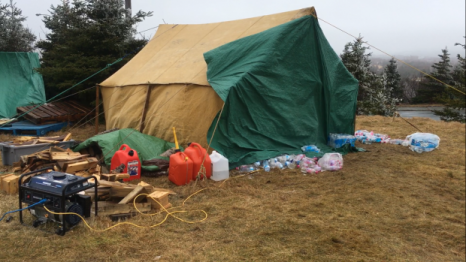
Day 10; Hunger Strike of Canadian Fisherman Richard Gillett – ‘Richard is very, very weak’
As Richard Gillett hits Day 10 of his hunger strike outside the Fisheries and Oceans building in St. John’s, his father wants him to stop it. His father, John Gillett, was standing outside in the misty rain on Saturday, with about 20 other protesters. “Richard is not doing well today. Richard is very, very weak,” said John Gillett. But, said John Gillett, somebody — “unfortunately, it’s my son” — has to stick up for the Newfoundland fishery. “This is a fish harvester who’s sick of kicking the can down the road and being bullied by the government, by DFO, and he’s going to be bullied out of the fishery just like a good many more people are.” (he’s right, you know. Set up to fail from poor fishery management.) click here to read the story 16:57
Debate simmers over Atlantic oil, gas exploration
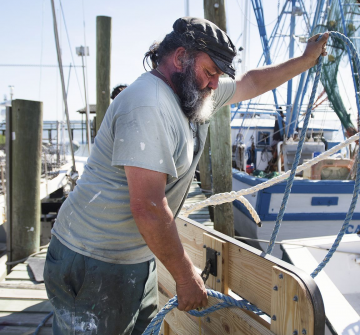 On this dock, where captains and first mates are freshening their boats with coats of white paint and rigging up new shrimp trawling gear to take to springtime Atlantic waters, the debate over drilling for oil in East Coast waters divides colleagues and, occasionally, families. Much of Capt. Wayne Magwood’s pro-offshore drilling stance comes down to a pocketbook issue. Burning through 1,000 gallons of diesel a week in his boat Winds of Fortune is manageable with low diesel costs, but past high fuel prices have made the economics of shrimping nearly impossible. “I’m tired of paying $4 a gallon. I’d like to pay $2 a gallon,” the 64-year-old Magwood said. “We don’t want to be dependent on foreign oil. We can’t get it when we need it. I think it’s good for the local economy. Environmentalists are doing a good job of regulating it and they’ve done a good job in the Gulf.”,, But to many on South Carolina’s coast, good money isn’t about oil. It’s about a way of life, attractive to locals and visitors alike. click here to read this big article. 13:29
On this dock, where captains and first mates are freshening their boats with coats of white paint and rigging up new shrimp trawling gear to take to springtime Atlantic waters, the debate over drilling for oil in East Coast waters divides colleagues and, occasionally, families. Much of Capt. Wayne Magwood’s pro-offshore drilling stance comes down to a pocketbook issue. Burning through 1,000 gallons of diesel a week in his boat Winds of Fortune is manageable with low diesel costs, but past high fuel prices have made the economics of shrimping nearly impossible. “I’m tired of paying $4 a gallon. I’d like to pay $2 a gallon,” the 64-year-old Magwood said. “We don’t want to be dependent on foreign oil. We can’t get it when we need it. I think it’s good for the local economy. Environmentalists are doing a good job of regulating it and they’ve done a good job in the Gulf.”,, But to many on South Carolina’s coast, good money isn’t about oil. It’s about a way of life, attractive to locals and visitors alike. click here to read this big article. 13:29
Downeast fishermen use old trick to battle higher bait prices
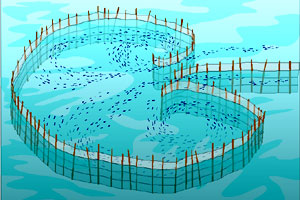 Two Washington County fishermen plan to invest in an ancient technology to combat a new problem — namely, the high cost of lobster bait. The Quoddy Tides reported that the fishermen will borrow pile-driving equipment to start creating a weir fishing system, the first used in that area in 15 years. Lobster bait, primarily herring, is selling for as much as $90 for a “tote” unit. The high costs last summer reportedly drove Maine lobster fishermen to start buying porgies from as far away as New Jersey. click here to read the story 11:53
Two Washington County fishermen plan to invest in an ancient technology to combat a new problem — namely, the high cost of lobster bait. The Quoddy Tides reported that the fishermen will borrow pile-driving equipment to start creating a weir fishing system, the first used in that area in 15 years. Lobster bait, primarily herring, is selling for as much as $90 for a “tote” unit. The high costs last summer reportedly drove Maine lobster fishermen to start buying porgies from as far away as New Jersey. click here to read the story 11:53
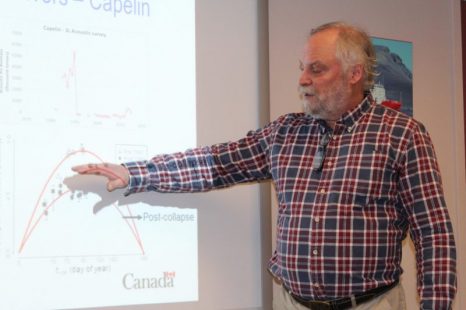
Speaking of Science, DFO says trust the science!
In the midst of ongoing protests outside of the Department of Fisheries and Oceans in St. John’s Friday, several DFO staff briefed reporters on fisheries science and the approach to resource management. At the Canadian Coast Guard building on Southside Road, they walked through an overview of ongoing scientific study and management work specific to Newfoundland and Labrador. The presentations spoke to the extent and effect of ecosystem changes, including the recent and painful quota cuts to both northern shrimp and crab. A biomathematician and employee for more than 30 years with DFO, Dr. Pierre Pepin spoke to the department’s seasonal ocean climate monitoring and trawl surveys, among other work. He said the science being conducted in the region is robust, and the reports and advice coming from DFO scientists can be trusted as a fundamental source of information. click here to read the story 09:46
Speak plain English: Scientists can do better job talking to fishermen
 Fishermen and DFO scientists may never stand on the same side when it comes to fish quotas and stocks, but the gap can — and should — be bridged, according to an academic director at Memorial University’s Fisheries and Marine Institute. “The fact that there is so much controversy is indicative that communication is a necessary component … If we’re going to find a way forward, we’re going to have to keep talking,” said Brett Favaro, director of the Fisheries Sciences program. “I think this is a really difficult situation.”,, “What we want is the next generation of researchers to be literate in communicating their science, not just — as we say — within their ivory tower … but also be able to mobilize that knowledge and engage with people in conservation groups and industry, in government, to help make that research have a direct impact on the world.” Click here to read the story 09:32
Fishermen and DFO scientists may never stand on the same side when it comes to fish quotas and stocks, but the gap can — and should — be bridged, according to an academic director at Memorial University’s Fisheries and Marine Institute. “The fact that there is so much controversy is indicative that communication is a necessary component … If we’re going to find a way forward, we’re going to have to keep talking,” said Brett Favaro, director of the Fisheries Sciences program. “I think this is a really difficult situation.”,, “What we want is the next generation of researchers to be literate in communicating their science, not just — as we say — within their ivory tower … but also be able to mobilize that knowledge and engage with people in conservation groups and industry, in government, to help make that research have a direct impact on the world.” Click here to read the story 09:32
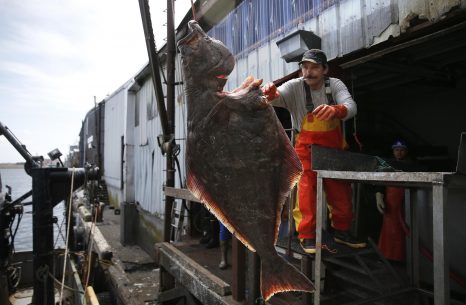
Loss of ‘Codfather’ permits could hurt New Bedford
By late morning just before Easter weekend, three fishing vessels lined up at the docks to unload their catch, and they all belonged to one man — the local mogul known as the “Codfather,” Carlos Rafael. “It’s a good haul,” a passing auction worker at the Whaling City Seafood Display Auction said under her breath, as crew members, some still in their orange waterproof bibs, unloaded the ice-packed fish. But now, Rafael’s recent conviction on federal charges that he cheated fishing regulations to boost his profits is putting his many vessels and permits up for grabs — potentially distributing them to ports along the New England coast. That would deliver an economic blow to New Bedford and the people who depend on the business created by Rafael’s fleet. If his permits are seized as expected, the National Oceanic and Atmospheric Administration, the regulatory agency known as NOAA, could reissue the permits to fishermen elsewhere in the region. “There are a lot more innocent people who could get punished by this,” said Jim Kendall, a former fisherman who runs New Bedford Seafood Consulting. click here to read the story 09:00
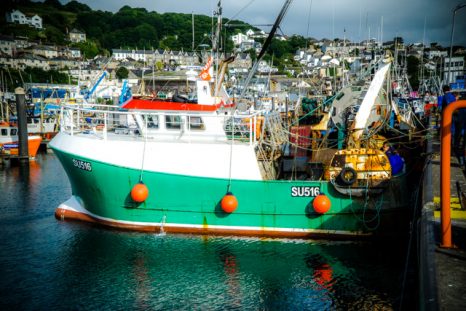
VMS – Fishermen living in a police state – makes the Stazi and Big Brother look benign!
Here’s an example of what has happened to the fishing industry and how closely monitored its operations have become – now, almost the entire fleet are policed remotely using a VMS (vessel Monitoring System) that tracks their every move. Fishermen have to pay for the privilege of being watched 24/7 and maintain the equipment directly from what comes out out of the cod-end – which they are happy to do – but, if for any reason the system fails, they are immediately contacted by the MMO who insist that they report their position manually every 4 hours and return to port immediately to fix the problem – when they will be detained until they have done so!…This is exactly what happened to the Spirited Lady III yesterday click here to read the story 08:09


































